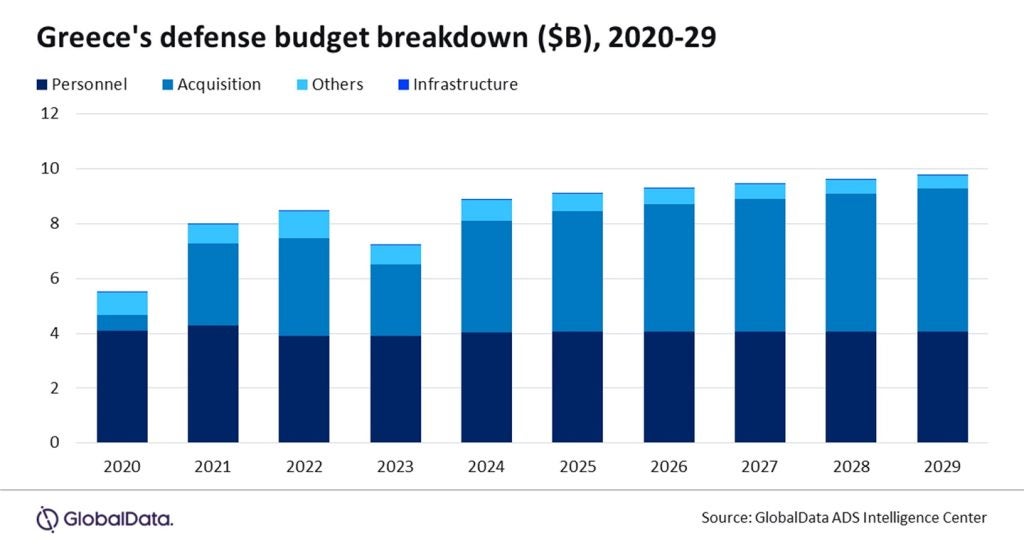GlobalData’s “Greece Defense Market 2024-2029” report tasks Greece’s defence spending to develop, although it’s going to fall in need of Nato’s 2% GDP goal.
Greece’s defence price range is forecast to extend steadily over the subsequent 5 years, reaching $9.8bn (€8.7bn) by 2029, in accordance with the newest report by GlobalData, a number one knowledge and analytics firm. Whereas the projected progress indicators elevated funding, it additionally reveals Greece’s continued battle to fulfill Nato’s spending benchmark as a consequence of persistent financial constraints and political divisions.
The report, titled “Greece Defense Market 2024-2029“, highlights key traits, together with a lift to Greece’s acquisition price range and the stabilisation of personnel prices, pushed by the nation’s massive army forces and conscription system. This dynamic will form the defence panorama in Greece, with implications for each home and worldwide defence contractors.
Acquisition progress to steer defence spending
The GlobalData report reveals that Greece’s defence price range, which stood at $5.5bn in 2020, is ready to rise by greater than 75% over the subsequent decade, with acquisitions making up a good portion of this enhance. From $0.59bn in 2020, the acquisition price range will soar to $5.22bn by 2029, signalling the federal government’s dedication to modernising its army platforms throughout all domains—air, land, and sea.

Wilson Jones, Defence Analyst at GlobalData, notes, “The most important part of Greece’s price range has traditionally been personnel prices, which have remained simply over $4bn yearly as a consequence of Greece’s massive army forces of over 200,000. Nonetheless, the true shift is in acquisition, reflecting the federal government’s deal with platform modernisation.”
This stream of acquisition spending can be instrumental in strengthening Greece’s defence industrial base. Many platforms are produced domestically or by offset agreements. That is anticipated to take care of a workforce within the Greek defence sector whereas additionally benefiting worldwide defence contractors concerned within the manufacturing and supply of techniques.
Entry essentially the most complete Firm Profiles
available on the market, powered by GlobalData. Save hours of analysis. Acquire aggressive edge.
Firm Profile – free
pattern
Your obtain e-mail will arrive shortly
We’re assured concerning the
distinctive
high quality of our Firm Profiles. Nonetheless, we would like you to take advantage of
useful
resolution for what you are promoting, so we provide a free pattern that you could obtain by
submitting the beneath kind
By GlobalData
Key modernisation programmes drive investments
A number of modernisation programmes underpin Greece’s defence investments. Amongst these is the acquisition of 24 Rafale fighter aircraft from France, aimed toward changing the ageing Mirage 2000 fleet. Moreover, Greece lately joined the F-35 Lightning II international alliance by signing a Letter of Supply and Acceptance (LOA) for 20 F-35 fighter jets, with an possibility for 20 extra. Along with the Rafale programme, this can improve the nation’s aerial capabilities.
On the naval entrance, Greece is strengthening its maritime defence by procuring four new multi-purpose frigates and modernising four MEKO-class frigates. Greece may even acquire four MH-60R Seahawk helicopters, with the choice to buy extra items sooner or later.
These acquisitions are complemented by investments in land forces, together with anti-tank weapons, guided missiles, and heavy torpedoes. Greece has additionally dedicated to increasing its unmanned aerial automobile (UAV) capabilities, with UAVs set to play roles in reconnaissance and assault operations.
Jones explains, “The mixture of superior plane acquisitions, naval upgrades, and elevated UAV capabilities will act as pressure multipliers, considerably enhancing Greece’s defence posture, notably within the Aegean Sea, the place tensions with Turkey stay excessive.”
Balancing financial challenges and wishes
Regardless of these developments, Greece faces financial and political headwinds that might hinder its capability to fulfill long-term defence objectives. The nation’s defence spending as a share of GDP is predicted to stay within the mid-1% vary by 2029, falling in need of NATO’s 2% goal. This shortfall displays the problematic steadiness between financial restoration and home political pressures.
This isn’t an remoted challenge, as Mediterranean neighbour Spain also seeks to align with Nato’s 2% GDP defence spending goal.
This implies alternatives could also be concentrated in particular programmes, notably acquisition and modernisation, for defence contractors, each native and worldwide. Nonetheless, political uncertainties and price range constraints may result in delays or changes in procurement schedules.
Implications for the defence trade
The deal with home manufacturing and expertise switch presents alternatives for collaboration between Greek companies and worldwide defence corporations. With Greece prioritising self-reliance and industrial progress, international companions might profit from joint ventures or offset preparations that assist meet Greece’s army modernisation wants whereas aligning with native industrial insurance policies.
Jones concludes, “Greece’s rising defence commitments, coupled with steady inhabitants figures and an increase in GDP, will permit for elevated spending per capita. It will translate right into a continued deal with acquisitions, though the trade should stay vigilant to potential dangers stemming from financial and political volatility.”